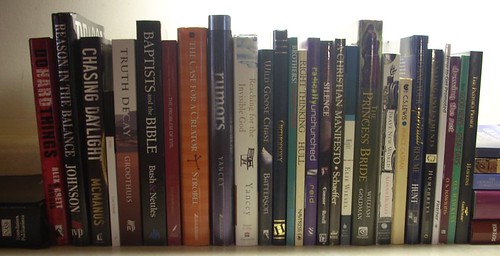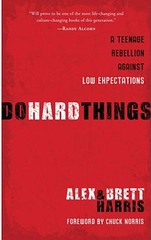I accomplished a goal of mine and read an average of 2 books per month in 08.

Here is the list and a few brief words about each. This list is in the order of the books in the photo. The books that are not pictured are at the end. There's some good ones there that you should not ignore.
- Do Hard Things: A Teenage Rebellion Against Low Expectations
- Alex & Brett Harris. This was the best book I read this year. I reviewed it here.
- Reason in the Balance
- Phillip Johnson. Excellent book. It is slightly outdated and it isn't as good as Darwin on Trial
. But it is definitely worth your time.
- Chasing Daylight: Seize the Power of Every Moment
- Erwin Raphael McManus. I reviewed this book here.
- Done.
- Cary Schmidt. This is really a long-form religious tract. But it is really great. I may give it out in the future.
- Truth Decay: Defending Christianity Against the Challenges of Postmodernism
- Douglas Groothuis. A good book offering context to the gospel.
- Baptists and the Bible
- Russ Bush. I read this because Dr. Bush died this year, and it is clearly a classic. Easily the most important book of the conservative resurgence in the SBC, it is very academic and not for the weak.
- The Problem of Evil
- Chuck Colson. Nothing special here. But not bad
- The Case for a Creator - Lee Strobel. Exactly like all the other "Case For" books. If you liked them, you'd like this.
- Rumors of Another World: What on Earth Are We Missing?
- Philip Yancey. Yancey wrote one of my top 10 books ever so I find myself reading him regularly. But I honestly cannot even remember what this book was about. Though it was better than the next book on this list, it was nothing special.
- Reaching for the Invisible God
- Philip Yancey. See above.
- Wild Goose Chase: Reclaim the Adventure of Pursuing God
- Mark Batterson. I reviewed this book here.
- Orthodoxy: The Annotated Edition
- G.K. Chesterton. Nobody in the history of literature has been more clever than Chesterton. This is a good book but a bit inaccessible.
- Brothers! Calling Men into Vital Relationships
- Jeff Gorsuch. We read this for a small group Bible study at my church. It's pretty good for that purpose.
- Right Thinking
- Bill Hull. My official review...meh
- Radically Unchurched: Who They Are-How to Reach Them
- Alvin Reid. This book was good, but not as good as Raising the Bar.
- Sinful Silence: When Christians Neglect Their Civic Duty
- Ken Connor. I got this book free at the SBC. It was interesting but I did not buy into its thesis. If you want to know more, ask me in the comments.
- A Christian Manifesto
- Francis Schaeffer. Usually Schaeffer ages well, but this book felt oddly dated.
- Night
- Elie Wiesel. I read this in high school. It is haunting, fascinating and great. Read it in one afternoon.
- The Princess Bride
- William Goldman. Another reread, this book is laugh-out-loud hilarious. better than the movie which is also great.
- Brave New World (P.S.)
- Aldous Huxley. I read this because it is a cliché. It is similar to 1984, but not as good.
- Prince Caspian (Narnia)
- C.S. Lewis. I read this when I heard the movie was coming out. it took 2 hours 15 minutes to read, the movie was 2:36 or something.--->Here through 27 are freebies I read to get through my bookcase<---
- Building Your Spiritual Resume (Developing A Testimony That Will Outlast You)
- Johnny Hunt. this is a free book I got during my seminary days. I read a bunch of those this year. Hunt's testimony is entertaining. Otherwise the book was pretty dull.
- Lasting Investments - Kent Humphreys. Another free book contains a great ministry idea. I probably would recommend this book to my pastor friends.
- How to Get Promoted - Michael Fletcher. This book appeared on my door as a gift from a local charismatic church. It was okay but I would not buy it. If you are interested in workplace success, I'd recommend virtually anything by John Maxwell over this book.
- Drawing the Net: 30 Practical Principles for Leading Others to Christ Publicly and Personally
- OS Hawkins
- Good News For Great days 2 - OS Hawkins
- The Pastor’s Primer
- O.S. Hawkins----->These are not in the picture<---
- unChristian: What a New Generation Really Thinks about Christianity… and Why It Matters
- David Kinnaman. This is the second best book I read this year. It should be at the left of the photo above but I loaned it out. For a further review ask me in the comments. Seriously an excellent book.
- The Final Quest
- Rick Joyner. I borrowed and read this book because every charismatic person I know thinks this book is excellent. I did not really like it, but it wasn't terrible. The problem is that it was sort of boring, but it was meant as a devotional.
- 3:16: The Numbers of Hope
- Max Lucado. Like every other Lucado book...fluffy, devotional, and interesting.
- Ender's Game - Orson Scott Card. I actually listened to this as an audiobook. (Checked out from the Cumberland County library) It was utterly fascinating from start to finish. I absolutely loved this book. Maybe it was just well-done on audio, but I would put it third from the left if I had a physical book.
Feel free to share your list in the comments.

 Last week I read
Last week I read